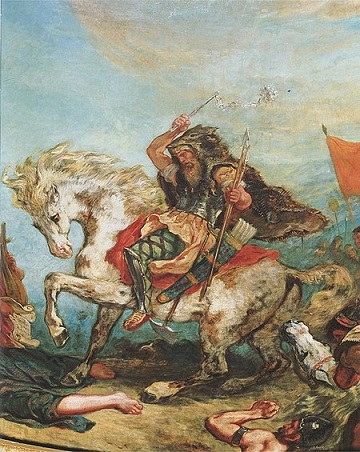
Image by Eugene Delacroix courtesy of wikipedia.org
Henry David Thoreau’s, Waldon Pond was assigned reading in my undergraduate years but I managed to avoid the book. Not until my 70s when I was recuperating from surgery did I turn to it and then, only because it was the one volume I could reach without getting out of bed. I flipped to the first page with reluctance then soon found myself drawn into the narrative, amazed that the author’s description of a leaf could force me to ponder the interconnections between nature, man, and the cosmos.
The chapter entitled “The Batte of the Ants” turned my delight into chagrin, however. Thoreau, having seated himself one afternoon beneath the shade of a tree, its roots clinging at the edge of a trickling stream, the author’s gaze fell upon a Lilliputian conflict taking place at his feet, noting that it had all the hallmarks of human carnage.
..the black soldier had severed the heads of his foes from their bodies, and the still living heads were hanging on either side of him like ghastly trophies at his saddle-bow, still firmly fastened as ever, and he was endeavoring with feeble struggles being without feelers and with only the remnant of a leg… to divest himself of them.
Could Homer in his Odessy have written a more brutal demise for Achilles? The sole difference I could discern was that the Greek skirmish didn’t occur beneath a pear tree in a patch of dirt easily decimated by the heel of Thoreau’s boot.
Size, of course, is relative. How does the scale of human events compare to the universe? A mote in the eye of a black hole, I suspect. Nonetheless, a cartographer will draw in earnest longitudinal and latitudinal lines on a map with the intent of describing the boundaries of nations where no lines or boundaries exist except in the human mind. Even so, our species will fight to destroy an entire civilization, razing the last blade of grass to the ground in the mistaken notion that what they’ve accomplished is heroic.
What puzzled Thoreau and puzzles many still is how we came to this buffoonery—sacrificing our species for a lump of clay with no greater import than the patch the ants proved willing to die for. I fight out of duty to the motherland said a Russian soldier to justify his part in his country’s Ukraine invasion. What madness is this, I must ask, when an invader sees himself as a victim of the chaos he creates?
Vladimir Putin is chief among the afflicted. He took up arms against his neighbor because he could and with no better outcome in mind for his people than that a majority of them would pay no price for the slaughter. The cost of war would be borne by the least among them: prisoners, the poor, and Asians who live in outlying regions of the country.
As reliable as gravity, the unwritten law of conquest is that no one with a healthy stock portfolio should be inconvenienced. In the event of an unexpected unpleasantness, rather than see their young return home in body bags, for example, the rich will remove themselves, diverting their yachts headed for playgrounds of the Crimea to the Black Sea. At home, a Moscovite woman draped in furs chooses to lower her eyes in disgust at the sight of a soldier robbed of his legs in Backhmut. War is tolerable if it is invisible.
The same standard of invisibility applies to rabble who protest Putin’s war in the streets. Soon enough they will find a prison bed waiting for them. Not that public protests matter in authoritarian states. To accomplish their overthrow, first cracks must appear in the power structure, enough to break old alliances for a different set of self-interests. Only a stupid fly…follows a dead body to the grave. (“Don’t Count the Dictators Out,” by Lucan Ahmad Way, Foreign Affairs, July/Aug. 2023, pg. 112.).
The poor and the disenfranchised are easier to rally than the rich. First, there must be a perceived enemy and a call to patriotism. Second, those who are about to risk death must believe acts of heroism will raise them above their station. Third, their commanders must keep them ignorant of the war’s progress so they will continue to fight against all odds, allowing them to endure torments capable of unraveling the mind.
To be blunt, the tools of war are ignorance, fear, and hate. When whipped into a frenzied state, soldiers are less likely to see themselves as pawns in a game where demigods exchange human life for personal power.
After centuries of such carnage, the time has come to change the rules of engagement. If war’s purpose is to advance the interests of the rich and powerful, then send the rich and powerful to the battlements. Leave the young to fulfill their destinies unencumbered by the greed of their elders. Then see how lightly the obligation of war will fall from their shoulders. Observe the amazement of the poor and disenfranchised when they realize they have an equal right to stand beneath the sun.
Why a black aunt fights a red ant to the death is a mystery to me. But I know the that will to power drives human history. Small men will always seek vainglory, a substance found nowhere in the universe except in our minds.
